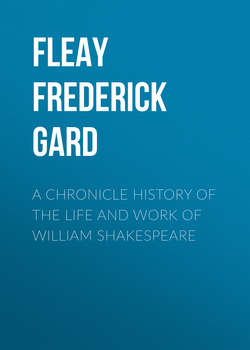Читать книгу A Chronicle History of the Life and Work of William Shakespeare - Fleay Frederick Gard - Страница 4
SECTION II.
THE PERSONAL CONNECTIONS OF SHAKESPEARE WITH OTHER POETS
ОглавлениеOne of the objects of the present treatise is to bring into clearer light the relations of Shakespeare with contemporary dramatists. Strangely enough this has scarcely been attempted in earlier biographies. His dealings in malt have been carefully chronicled: his connections with poets have been slurred over. It will be useful, therefore, to gather up the scattered notices of personal contact between him and his fellows in dramatic production. Mere allusions to his works, whether complimentary or otherwise, will not come under this category. Such will be found collected, and well collected, in Dr. Ingleby's Century of Praise; but they consist almost entirely of slight references to his published works, and have no bearing of importance on his career. Nor, indeed, have we any extended material of any kind to aid us in this investigation; one source of information, which is abundant for most of his contemporaries, being in his case entirely absent. Neither as addressed to him by others, nor by him to others, do any commendatory verses exist in connection with any of his or other men's works published in his lifetime – a notable fact, in whatever way it may be explained. Nor can he be traced in any personal contact beyond a very limited circle, although the fanciful might-have-beens so largely indulged in by his biographers might at first lead us to an opposite conclusion.
With John Lyly, the founder of English Comedy, he seems to have had no personal intercourse, although the reproduction by him of many of Lyly's puns and conceits, and some few of his dramatic situations, distinctly prove that he had carefully examined his published plays. Nor does the solitary reference to Shakespeare in Greene's Groatsworth of Wit, however it may display strong personal feeling, lead us to suppose that there had been any personal relations between these dramatists; in fact, the very wording of the passage properly understood distinctly disproves the existence of such relations. Of all the dramatists who had preceded him on the London stage the only two with whom he can be even conjecturally brought in personal contact before the opening of the Rose Theatre in 1592 are Robert Wilson and George Peele. It is unlikely that he should have begun his career as a novice and journeyman independent of tutor or coadjutor, and a minute examination of the careers of these two dramatists leads me to infer that they were connected with the same company as Shakespeare in 1590-1. In any case, they were his immediate models in his early work in several respects. It is from Wilson that his liking for doggerel rhymes and alternately rhyming stanzas was derived: it is from Peele that his love tragedy of Romeo and Juliet– his only early tragedy – derived, in its earliest form, as acted in 1591, whatever in it was not Shakespeare's own. Wilson was probably his tutor or coadjutor in Comedy and Peele in Tragedy. But this is after all conjecture; on the other hand, it is certain that in 1592-3 a greater than Peele or Wilson was writing for the same company as Shakespeare, and necessarily in close connection with him. For Marlowe he certainly had a sincere regard: from his poem of Hero and Leander Shakespeare makes the only direct quotation to be found in his plays; on his historical plays Shakespeare, after his friend's decease, bestowed in addition, revision, and completion, a greater amount of minute work than on his own; and the earlier of his own histories were distinctly built on lines similar to those of Edward II. and Edward III. The relation of Shakespeare's Histories to Marlowe's is far more intimate than that of his Comedies or of Romeo to any predecessor's productions. I cannot find a trace of direct connection between Shakespeare and any other poet than these mentioned, during the life of Lord Strange. His connection with Lord Southampton seems to have been more intimate than any with his fellow-poets. In the Sonnets
